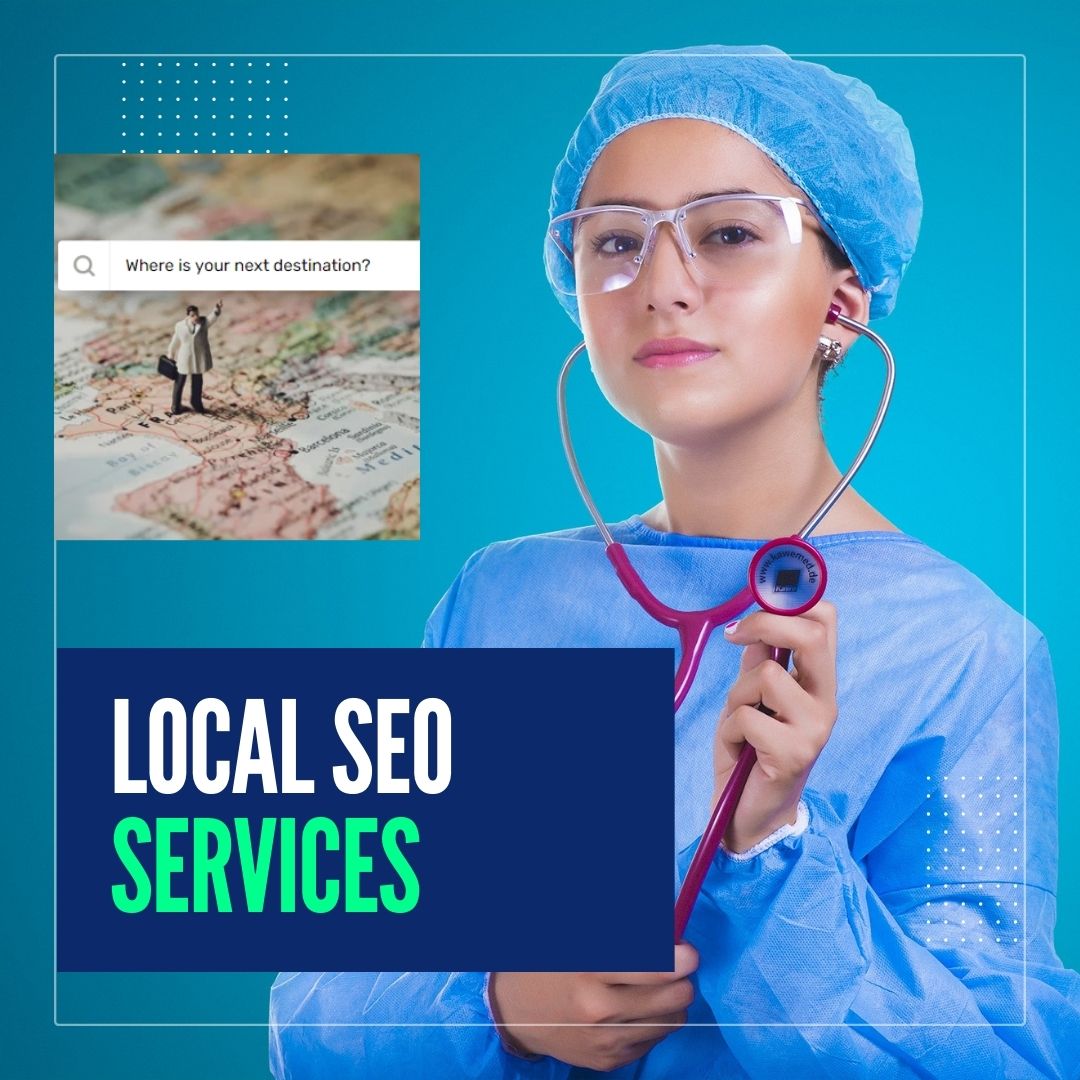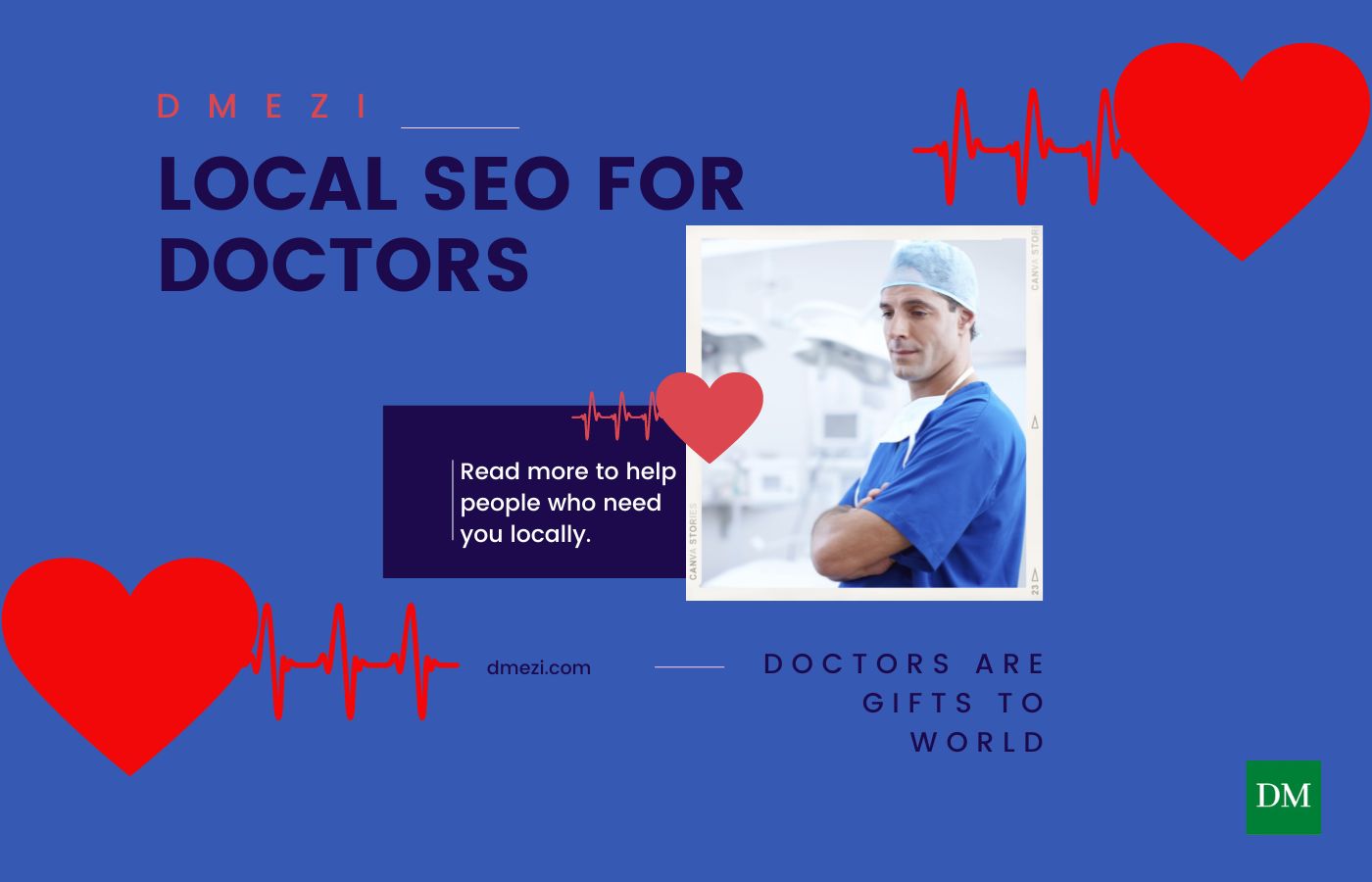Local SEO Services for Doctors
- Introduction
- Importance of Local SEO for Doctors
- What is Local SEO?
- Understanding Local SEO
- Definition and Basics
- Key Components of Local SEO
- Benefits of Local SEO for Doctors
- Increased Visibility
- Enhanced Reputation
- Improved Patient Engagement
- Better Targeting and Relevance
- Optimizing Your Google My Business (GMB) Profile
- Claiming and Verifying Your GMB Listing
- Optimizing GMB Information
- Adding Photos and Videos
- Encouraging Patient Reviews
- Website Optimization for Local SEO
- On-Page SEO Techniques
- Creating High-Quality Content
- Mobile Optimization
- Using Local Keywords
- Building Local Citations and Listings
- Importance of Citations
- Ensuring Consistent NAP (Name, Address, Phone Number)
- Leveraging Online Directories
- Managing Online Reviews and Reputation
- Importance of Online Reviews
- Responding to Reviews
- Encouraging Positive Reviews
- Handling Negative Reviews
- Utilizing Social Media for Local SEO
- Choosing the Right Platforms
- Engaging with the Local Community
- Sharing Local Content
- Implementing Local Link Building Strategies
- Importance of Backlinks
- Building Relationships with Local Businesses
- Guest Blogging and Sponsorships
- Tracking and Analyzing Your Local SEO Performance
- Using Google Analytics and GMB Insights
- Monitoring Keyword Rankings
- Adjusting Strategies Based on Data
- Conclusion
- Recap of Key Points
- Encouragement to Start Implementing Local SEO Strategies
Local SEO for Doctors: Boosting Your Practice’s Visibility
Introduction
In today’s digital age, having a strong online presence is crucial for any business, including healthcare practices. For doctors, local search engine optimization (SEO) is particularly important. Local SEO helps medical professionals connect with patients in their area, enhancing visibility and attracting more appointments. This comprehensive guide will walk you through the essentials of local SEO for doctors, helping you boost your practice’s online presence effectively.
Understanding Local SEO
Local SEO refers to the process of optimizing your online presence to attract more business from relevant local searches. These searches take place on Google and other search engines. When a potential patient searches for a doctor in their area, you want your practice to appear at the top of the search results.
Key Components of Local SEO
- Google My Business (GMB) Optimization: A well-optimized GMB profile is essential for local SEO.
- On-Page SEO: Ensuring your website content is optimized for local keywords.
- Local Citations: Ensuring your practice is listed in various online directories.
- Online Reviews: Managing and responding to patient reviews.
- Backlinks: Acquiring links from other local websites.
Benefits of Local SEO Services for Doctors
Increased Visibility
When potential patients search for medical services in your area, a strong local SEO strategy ensures your practice appears prominently in search results, increasing the likelihood of attracting new patients.
Enhanced Reputation
By maintaining accurate and detailed information online and managing patient reviews effectively, you can build a strong, positive reputation in your community.
Improved Patient Engagement
Local SEO helps you connect with your community by providing relevant and useful information to potential patients, which can lead to higher engagement rates.
Better Targeting and Relevance

Local SEO allows you to target specific keywords and phrases relevant to your services and location, ensuring you attract patients who are looking for exactly what you offer.
Optimizing Your Google My Business (GMB) Profile
Claiming and Verifying Your GMB Listing
The first step in local SEO is claiming your GMB listing. Google My Business is a free tool that allows you to manage how your business appears on Google Search and Maps. Once you claim your listing, ensure all information is accurate and complete.
Optimizing GMB Information
Make sure your GMB profile includes:
- Correct Business Name
- Accurate Address and Phone Number
- Website URL
- Office Hours
- Services Provided
Adding Photos and Videos
Include high-quality photos of your practice, staff, and services. Videos can also provide a virtual tour of your office or highlight patient testimonials, adding a personal touch.
Encouraging Patient Reviews
Patient reviews are critical for local SEO. Encourage satisfied patients to leave positive reviews on your GMB profile. Responding to reviews, both positive and negative, shows you value patient feedback and are committed to providing excellent care.

Website Optimization for Local SEO
On-Page SEO Techniques
- Title Tags and Meta Descriptions: Include local keywords in your title tags and meta descriptions.
- Header Tags: Use H1, H2, and H3 tags to organize your content and include local keywords.
- Alt Text for Images: Describe your images with local keywords in the alt text.
Read more about SEO Services at Dmezi in comparison to local SEO.
Creating High-Quality Content
Regularly update your website with informative and engaging content relevant to your practice and community. Blog posts about local health issues, patient success stories, and preventive care tips can attract and retain visitors.
Mobile Optimization
Ensure your website is mobile-friendly. Many patients will search for healthcare services on their mobile devices, so a responsive design is crucial.
Using Local Keywords
Identify and incorporate local keywords into your website content. Tools like Google Keyword Planner can help you find relevant local search terms.
Building Local Citations and Listings
Importance of Citations
Citations are mentions of your business name, address, and phone number (NAP) on other websites. Consistent and accurate citations help improve your local SEO.
Ensuring Consistent NAP
Ensure your NAP information is consistent across all online platforms, including your website, GMB profile, and online directories.
Leveraging Online Directories
Submit your practice to reputable online directories such as Healthgrades, Zocdoc, and Yelp. These listings can drive traffic to your website and improve your local SEO.
Managing Online Reviews and Reputation
Importance of Online Reviews
Online reviews influence how potential patients perceive your practice. Positive reviews can build trust and credibility, while negative reviews can deter potential patients.
Responding to Reviews
Respond promptly and professionally to all reviews. Thank patients for positive feedback and address concerns raised in negative reviews.
Encouraging Positive Reviews
Ask satisfied patients to leave reviews. You can provide them with simple instructions on how to do so.
Handling Negative Reviews
Address negative reviews calmly and professionally. Offer to resolve any issues offline, demonstrating your commitment to patient satisfaction.
Utilizing Social Media for Local SEO
Choosing the Right Platforms
Focus on social media platforms where your target audience is most active. Facebook, Instagram, and LinkedIn are popular choices for healthcare professionals.
Engaging with the Local Community
Share content that is relevant to your local community. Participate in local events and use social media to promote your involvement.
Sharing Local Content
Post updates about local health events, share local news, and provide health tips that are particularly relevant to your community.
Implementing Local Link Building Strategies
Importance of Backlinks
Backlinks from reputable local websites can boost your local SEO. They signal to search engines that your website is a trusted resource.
Building Relationships with Local Businesses
Collaborate with local businesses and organizations. This can lead to valuable backlinks and increased visibility in your community.
Guest Blogging and Sponsorships
Write guest blog posts for local websites or sponsor local events. Both strategies can provide backlinks and enhance your local presence.
Tracking and Analyzing Your Local SEO Performance
Using Google Analytics and GMB Insights
Monitor your website traffic and user behavior using Google Analytics. GMB Insights provides data on how patients find and interact with your GMB profile.
Monitoring Keyword Rankings
Track the performance of your local keywords using tools like SEMrush or Moz. This will help you understand which keywords are driving traffic to your website.
Adjusting Strategies Based on Data
Use the data you collect to refine your local SEO strategies. Focus on what works and make adjustments where necessary to improve your performance.
Conclusion
Implementing local SEO strategies can significantly enhance your practice’s visibility and attract more patients from your community. By optimizing your GMB profile, maintaining accurate citations, managing reviews, and creating high-quality content, you can build a strong online presence that stands out in local search results. Start implementing these strategies today and watch your practice grow. Keep in touch with Dmezi to know more.










